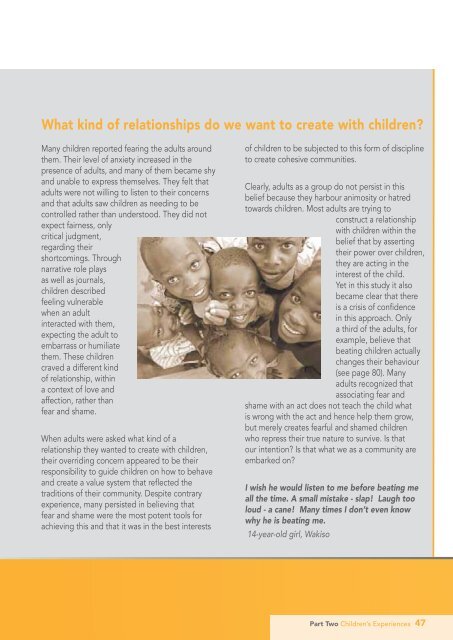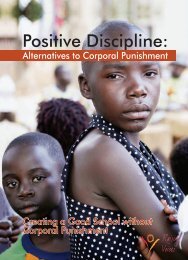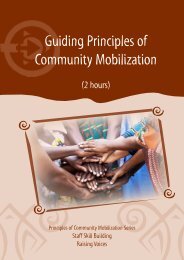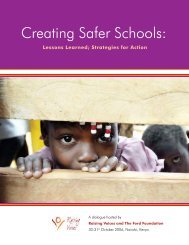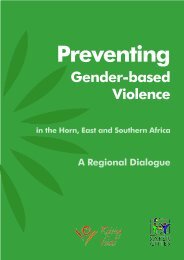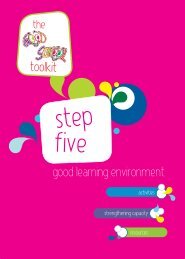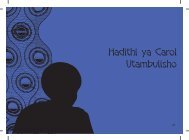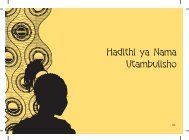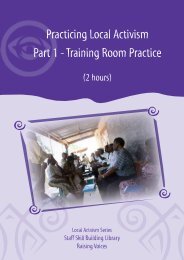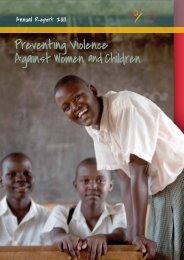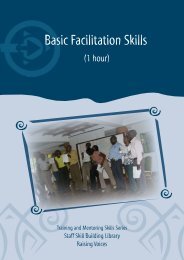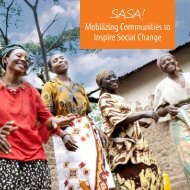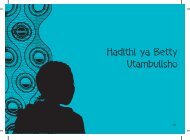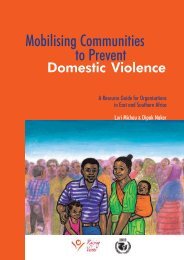Violence against children, the voices of Ugandan ... - Raising Voices
Violence against children, the voices of Ugandan ... - Raising Voices
Violence against children, the voices of Ugandan ... - Raising Voices
Create successful ePaper yourself
Turn your PDF publications into a flip-book with our unique Google optimized e-Paper software.
What kind <strong>of</strong> relationships do we want to create with <strong>children</strong>?Many <strong>children</strong> reported fearing <strong>the</strong> adults around<strong>the</strong>m. Their level <strong>of</strong> anxiety increased in <strong>the</strong>presence <strong>of</strong> adults, and many <strong>of</strong> <strong>the</strong>m became shyand unable to express <strong>the</strong>mselves. They felt thatadults were not willing to listen to <strong>the</strong>ir concernsand that adults saw <strong>children</strong> as needing to becontrolled ra<strong>the</strong>r than understood. They did notexpect fairness, onlycritical judgment,regarding <strong>the</strong>irshortcomings. Throughnarrative role playsas well as journals,<strong>children</strong> describedfeeling vulnerablewhen an adultinteracted with <strong>the</strong>m,expecting <strong>the</strong> adult toembarrass or humiliate<strong>the</strong>m. These <strong>children</strong>craved a different kind<strong>of</strong> relationship, withina context <strong>of</strong> love andaffection, ra<strong>the</strong>r thanfear and shame.When adults were asked what kind <strong>of</strong> arelationship <strong>the</strong>y wanted to create with <strong>children</strong>,<strong>the</strong>ir overriding concern appeared to be <strong>the</strong>irresponsibility to guide <strong>children</strong> on how to behaveand create a value system that reflected <strong>the</strong>traditions <strong>of</strong> <strong>the</strong>ir community. Despite contraryexperience, many persisted in believing thatfear and shame were <strong>the</strong> most potent tools forachieving this and that it was in <strong>the</strong> best interests<strong>of</strong> <strong>children</strong> to be subjected to this form <strong>of</strong> disciplineto create cohesive communities.Clearly, adults as a group do not persist in thisbelief because <strong>the</strong>y harbour animosity or hatredtowards <strong>children</strong>. Most adults are trying toconstruct a relationshipwith <strong>children</strong> within <strong>the</strong>belief that by asserting<strong>the</strong>ir power over <strong>children</strong>,<strong>the</strong>y are acting in <strong>the</strong>interest <strong>of</strong> <strong>the</strong> child.Yet in this study it alsobecame clear that <strong>the</strong>reis a crisis <strong>of</strong> confidencein this approach. Onlya third <strong>of</strong> <strong>the</strong> adults, forexample, believe thatbeating <strong>children</strong> actuallychanges <strong>the</strong>ir behaviour(see page 80). Manyadults recognized thatassociating fear andshame with an act does not teach <strong>the</strong> child whatis wrong with <strong>the</strong> act and hence help <strong>the</strong>m grow,but merely creates fearful and shamed <strong>children</strong>who repress <strong>the</strong>ir true nature to survive. Is thatour intention? Is that what we as a community areembarked on?I wish he would listen to me before beating meall <strong>the</strong> time. A small mistake - slap! Laugh tooloud - a cane! Many times I don’t even knowwhy he is beating me.14-year-old girl, WakisoPart Two Children’s Experiences 47


